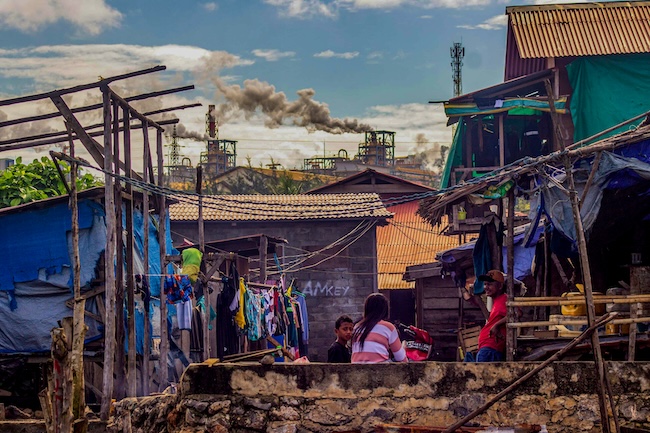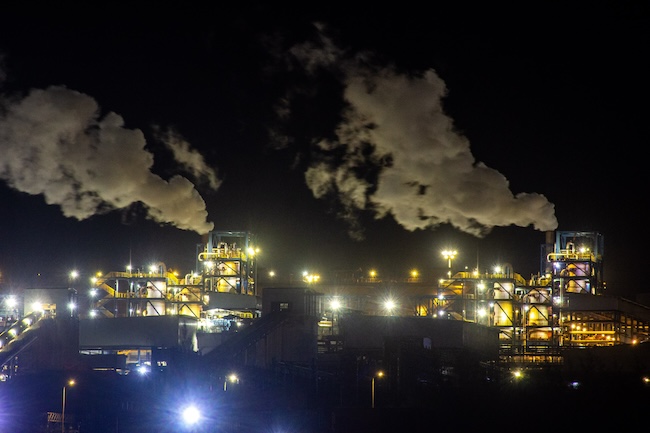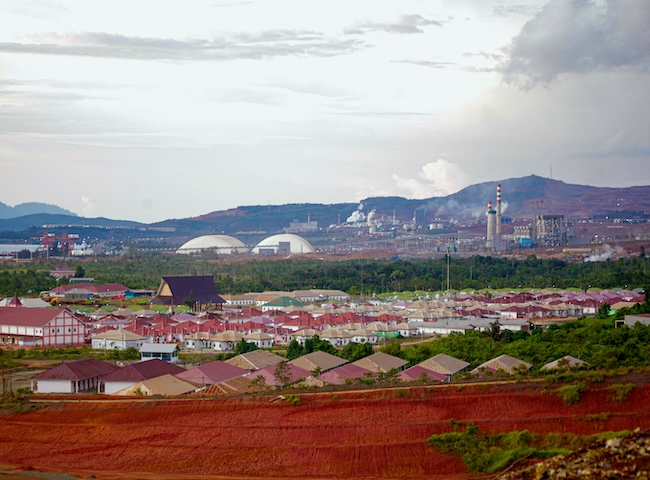Why is this happening to Obi Island?
Bapthista Mario Yosryandi Sara
Obi Island has become a tragic symbol of ecocide caused by nickel mining and smelting. The destruction on this island in South Halmahera Regency, North Maluku Province, home of the Obi Paradise Kingfisher, is now exceeding the threshold of ecological systems “annihilation.” But what actually is ecocide?
Ecocide
Where genocide is the crime of violence aimed at the destruction of a people, ecocide is even bigger. It is the large-scale and systematic destruction of the environment that threatens the survival of living beings, including humans. The British environmental lawyer Polly Higgins in 2010 submitted a proposal to the International Law Commission of the United Nations to make ecocide a crime under international law. She defined it as,
'extensive damage to, destruction of or loss of ecosystems of a given territory… to such an extent that peaceful enjoyment by the inhabitants of that territory has been severely diminished.'
The crime of ecocide is therefore not merely about environmental destruction. It also encompasses the violation of the human right of communities to peacefully enjoy the territory they inhabit.
One of those who worked throughout his life to have ecocide recognised as a 'crime against peace' was Richard A. Falk, an expert in international law. Already in 1973 he put forward a draft International Convention on the Crime of Ecocide that stated: 'man has consciously and unconsciously inflicted irreparable damage to the environment in times of war and peace.' Decades of international consultations later, ecocide remains 'the missing fifth crime against peace' in international law. But it still stands as a criticism of the global political and economic systems that enable the damage to continue legally.

Documentation shows that ecocide is occurring on Obi Island today. Industrial waste spills into the sea have paralysed coastal ecosystems; heavy sedimentation has destroyed coral reefs; sources of clean water have been contaminated with toxic heavy metals; fishing grounds have been decimated; and agricultural zones have been devastated by polluted air. Impacts are layered: from food insecurity—even the threat of sago extinction—to loss of traditional cultures and civilisations, social dislocation, and the rise of both horizontal and vertical conflicts.
Harita Group not only controls the nickel extraction business on Obi Island. It dominates the island’s socio-political ecosystem. It builds roads and public facilities, and even intervenes in government structures from the regional to the village levels. In some cases, government and community leaders are co-opted and turned into 'mouthpieces' for the corporation. Corporate power has assumed public functions. What remains to the people are narrow spaces for survival, resistance, or submission.
Colonialism
But there’s more. It is frequently said that Harita Group is playing a strategic role in supporting the global energy transition. Along with lithium and cobalt, nickel is a primary component of electric vehicle batteries. Indonesia has the world’s largest lateritic nickel reserves. But on Obi Island the energy transition reveals a new face: structural inequality.

As the global North—the United States, European Union, China—decarbonise, they are externalising the ecological costs to raw material-producing countries in the South. Max Ajl, in his book A People’s Green New Deal (2021), writes scathingly: 'the climate crisis is basically the child of northern imperialism, pure and simple.' Without dismantling the colonial foundations of the global economic system, the energy transition will simply replace fossil fuels with 'green' minerals while continuing to exploit land and labour in the global South. Instead of enjoying electric vehicles and being part of the high-value supply chain, many Obi Island citizens lack adequate electricity. They have to put up with industrial waste, the loss of seas and forests, and with political marginalisation.
Alf Hornborg writes in Nature, society, and justice in the Anthropocene (2019) that low-carbon technologies in developed countries are often built on the unequal transfer of ecological costs to developing countries. Indonesia becomes an importer of ecological damage in the name of global green modernity. The historian Jason Moore wrote in 2016 that capitalism transforms ecological elements like land, water, minerals, and even human labour into cheap commodities in order to generate profits: 'cheap nature.' The concept 'cheap' here refers not only to the market prices of those commodities. It also suggests that resources, communities, and even spaces are exploited on the cheap, without ethical or ecological accountability, by means of systemic violence.
Obi
The anthropologist Tania Murray Li in her book Land’s End (2014) describes how capitalist relations are forcibly embedded into the very fabric of community life through land dispossession and the severing of ecological connections. Capitalism does not operate solely by exploiting labour. It is also enabled through processes of 'access exclusion' to land and resources that were once collectively held by local communities. Li’s book was about the arrival of capitalism among Sulawesi highlanders in the form of cash crops. On Obi Island, capitalism arrives in the shape of the Harita Group, who have been mining lateritic nickel in Kawasi Village, Obi Subdistrict, since 2010.
As of December 2023, a total of 218 mining business permits had been issued, covering 34 small islands across Indonesia. The combined concession area of all these companies amounted to 274,550 hectares. The exploitation of small islands by miners exacerbates the natural vulnerabilities faced by coastal communities already dealing with the climate crisis and natural disasters. Extractive activity triggers new ecological disasters such as the contamination of ground- and surface water and of marine ecosystems. Local communities lose access to clean water and traditional fishing grounds.
Once known as part of a stunning island cluster with dense tropical forests and abundant marine resources, Obi has undergone a dramatic transformation. The island spans 3,111 square kilometres and is home to a population of 37,406. Today it is being ravaged by large-scale nickel mining. In concession areas, communities have been displaced from their livelihoods and residences; subsistence economic practices have been dismantled; dependence on a fragile and uncertain mining industry has taken their place.
The corporation is owned by the Lim family. It has a number of subsidiaries—PT Trimegah Bangun Persada (TBP), PT Obi Nickel Cobalt (ONC), PT Halmahera Jaya Feronikel, and PT Halmahera Persada Lygend (HPL). These operate large-scale nickel mining and smelting facilities on Obi Island. The corporation went public in 2023 (through PT TBP), establishing itself as a pioneer in Indonesia's nickel downstreaming industry. In 2020, the industrial zone in Kawasi village was designated a National Strategic Project (PSN) under Presidential Regulation Number 109/2020. It is blatantly evident that the corporation’s success has come through massive, systematic ecological destruction, resulting in lasting trauma for the local population.
Harita dominates the nickel industry with integrated processing and refining facilities that employ High Pressure Acid Leaching (HPAL) technology—notorious for its intensive water consumption and the production of hazardous waste, including acidic residues and heavy metals.
Among the financial institutions actively supporting this damaging extractivist agenda are Bank OCBC, Bank UOB, Bank Mandiri, Hana Bank, Indonesia Eximbank, Maybank, China Eximbank, Bank Central Asia, CIMB Niaga, Bank BNI, BNP Paribas, and Bank DBS. They facilitated Harita’s rise as a corporate giant reaping trillions of rupiahs in profits.

An investigative report by the Mining Advocacy Network (JATAM) in early 2025 revealed that Harita’s nickel business in 2023 emitted greenhouse gases amounting to 7.98 million tons of CO2 equivalent (MtCO₂e). This means that Harita alone contributed around 1% of Indonesia’s total greenhouse gas emissions for that year of 733.2 MtCO₂e. Its smelter operation alone (see photograph above) in that year produced emissions equivalent to 1.8 million four-wheeled vehicles: all the cars, trucks and buses in East Java, which is fifteen times the size of Obi.
Harita has left a trail of environmental destruction on Obi. The company’s entire industrial operation is extractive, ranging from mining to oil palm plantations. Everywhere it creates irreversible, multidimensional damage - dispossessing local people’s productive spaces, encroaching on food sources—both terrestrial and marine - and seizing rights to clean water and air. In terms of the “missing fifth crime against peace,” it is engaging in the “theft” of community peace by being a party to a series of social conflicts, divide-and-rule tactics, intimidation, and various forms of criminalising protest.
Reimagining the future
Harita Group claims it is part of the green energy transition. We must be wary of such rotten discourse. It is part of what many would call greenwashing or green extractivism—resource expropriation in the name of welfare and economic growth. The tangible reality behind nickel downstreaming for the global battery industry is ecocide in Obi Island. This is not merely about environmental destruction. It is structural violence aimed at marginalised communities, stripping their rights to land, water, clean air, and a future. In Obi, this violence occurs repeatedly, not just because the state is AWOL from its duty of protecting citizens, but because it is actively involved as architect of policy and a partner to capital.
What happens on Obi is also occurring in Wawonii Island, Morowali, Kolaka, and even Seram Island. It is time to listen to voices from the periphery—the cries of Kawasi residents, the fishermen of nearby Soligi village, the sorrow of mothers who have lost their water sources in Sukarela Jaya village on Wawonii. We need to reimagine a future that is not determined by the global market or the agenda of transnational oligarchies, but by communities living in harmony with nature.
Bapthista Mario Yosryandi Sara (Mario) (marioyosryandi30@gmail.com) is a researcher at TIKAR Institute; Transformative Innovation for Justice, Nature, and People (@tikarinstitute). He is pursuing an MA in political science at Universitas Nasional, Jakarta.












